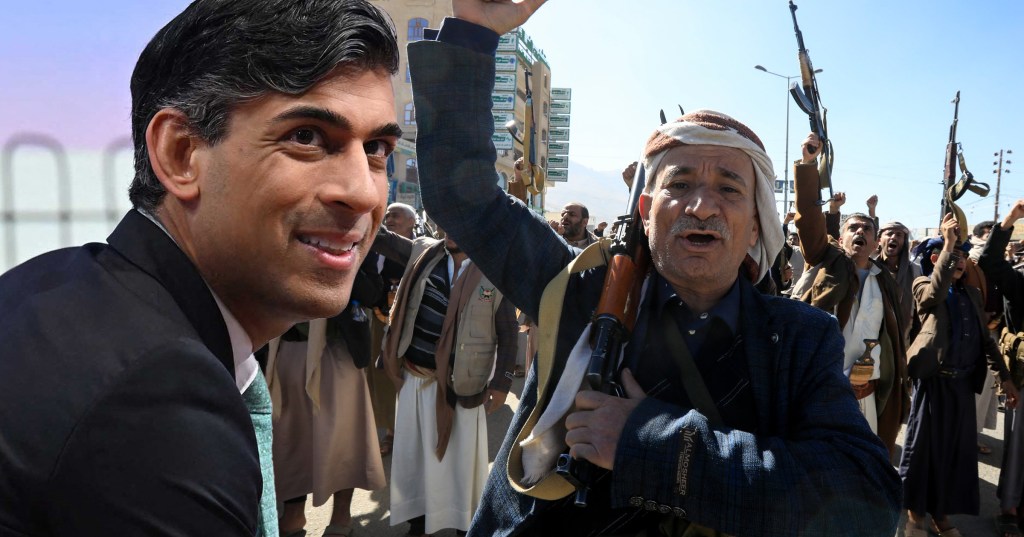MPs like me have been betrayed by Rishi on Yemen – where was our vote? – This feels like Iraq all over again!
Rishi Sunak (left) risks destabilising the region even further, but was this action a result of a political policy or protecting the commercial interests of investments?
This week the government made the decision to embark on military action, without so much as informing Parliament.
As the UK joined the US in striking targets connected to Houthi rebels in Yemen, MPs were left in the dark, unable to debate the pros and cons.
I am hugely concerned about what precedent this is setting for British democracy, and the wider destabilisation in the Middle East at a time when we are seeing so much death and destruction in the region.
Nearly 100 days on from Hamas’ horrific terror attacks on October 7, with over 20,000 killed and devastation for so many families, my own relatives in Gaza City included, the warnings of the wider region becoming a tinderbox are louder than ever.
That is the backdrop to these strikes, which occurred after an escalation in the activities of Iranian-backed Houthi rebels who have attacked numerous ships in the Red Sea, claiming their actions are part of an attempt to end the offensive on Gaza.
This is causing major disruption to international shipping routes, with vessels diverting around Africa on a journey of an extra 3,500 nautical miles at a cost of £1.6million per trip.
A UN Security Council resolution passed on Wednesday condemned the activities, and demanded that the Houthis immediately cease all such attacks – and my party, the Liberal Democrats, add their voice to this call.
They are not only de-stabilising in a region fraught with conflict and tension, but will surely have a significant impact on the cost of living here in the UK. Economists estimate shipping diversions could cause the UK economy to shrink.
And that is why the UK Government has embarked on joint military action with the USA against Houthi targets – saying it is a defensive move given a recent attack on a British vessel.
The escalation by Houthi rebels comes amid the conflict in Gaza
I can see their rationale, but there are finely balanced judgements to be made regarding the likelihood of retaliation and escalation.
These are arguments that could and should be set out by the government for MPs to debate in the House of Commons and they have failed to do so.
It’s vital that we know more. It remains unclear what consultation was had with key states in the region – most notably Saudi Arabia, Egypt and Jordan.
And we need to know the end game. If this spirals out of control what safeguards do we have in place? Frankly, we don’t seem to know what the plan is.
It’s because of this instability and uncertainty that we need to tread carefully.
More broadly, it’s vitally important that we stop the conflict out of which this is all spiralling.
That means working towards a political solution and preventing Israel from bomibing Palestine back into the stone-age– which will make the region far more secure.
For months now, Liberal Democrats have been calling for an immediate bilateral ceasefire, securing the hostages’ release, removing Hamas from Gaza, delivering aid, and ultimately working towards a two-state solution.
Rishi Sunak should have come to parliament to explain his rationale
Not only will that deliver peace and security for Palestinians and Israelis, but it is a preemptive move against regional escalation, pulling the rug out from under the Houthi rebels and their Iranian paymasters.
But Britain’s response to any and all escalations need to be taken in Parliament.
The decision to conduct these airstrikes was made without Rishi Sunak coming before MPs – meaning the earliest opportunity for MPs to question ministers is on Monday.
This action was trailed for days, even weeks, with comments from the Defence Secretary saying ‘watch this space’ making clear military strikes were on the table. We could have had a preemptive debate and vote on the principles and parameters. But we did not.
There should now be a retrospective vote to ensure MPs are not silenced – and there is precedent for this too – a certain David Cameron gave a vote on intervention in Libya when Parliament made clear it didn’t want to take part.
Without ministers coming to Parliament to explain their reasoning, we can’t make a judgement on whether the right course of action was taken, and as MPs we take these life or death decisions incredibly seriously.
Forgive me if I don’t want to give the Tories and Labour, who are backing the strikes, a blank cheque. They’ve got these things wrong before. They should welcome the scrutiny.
The convention, which emerged in the wake of the Iraq War, that Parliament should be given the opportunity to debate and vote on any prospective action, was hard-fought.
But this week’s events are a worrying sign that we are slipping back to where we were before 2002.
The UK has a historic obligation to this region as well as our own people, and our democratic principles.
For that reason, the Liberal Democrats will continue to call for the upholding of our parliamentary conventions, an immediate bilateral ceasefire, and to not lose sight of the political horizon and that precious peace in the Middle East.
I am hugely concerned about what precedent this is setting for British democracy, and the wider destabilisation in the Middle East.


